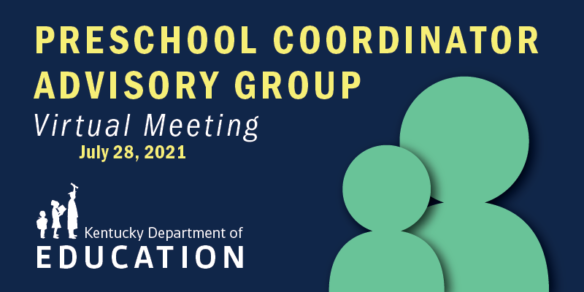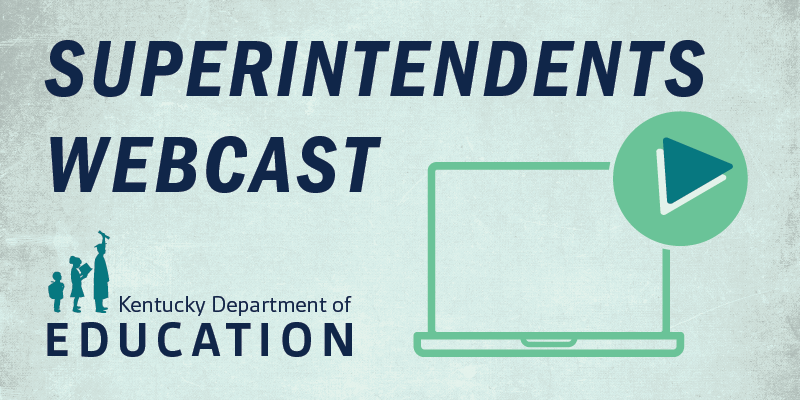
By Jacob Perkins
Jacob.perkins@education.ky.gov
Kentucky preschool enrollment has steadily declined from 2010 to 2020, said Bill Buchanan, education program consultant in the Kentucky Department of Education’s (KDE) Division of IDEA Implementation and Preschool.
The state did experience a slight rebound in enrollment around 2015, only to drop again due to the pandemic, Buchanan said.
Buchanan’s comments were delivered to KDE’s Preschool Coordinator Advisory Group (PCAG) during a July 28 joint virtual and in-person meeting.
State law requires each school district to establish and maintain an active recruitment process that assures preschool enrollment of eligible children.
Preschool programs are available to 4-year-old children who are considered “at risk,” meaning they are eligible for state-funded preschool if they live in a household with income up to 160% of the federal poverty level. Preschool also is available for 3- and 4-year-old children with disabilities. Enrollment of a child in the preschool program is at the discretion of the parent or legal guardian.
Children who attend public preschool in Kentucky – including Head Start – are more likely to be prepared for kindergarten than those who do not, Buchanan said. Additionally, long-term research shows the effects of preschool are beneficial and cost-effective, as students are more likely to attend and perform well in school, engage in pro-social behaviors, and graduate from high school and college, he added.
Though research backs up the benefits of preschool, since 2010, the Commonwealth has experienced a consistent drop in the number of families who participate.
Each year, the National Institute for Early Education Research determines state preschool rankings in two areas related to access; the percentage of 3-year-olds and 4-year-olds enrolled in state-funded preschool.
In 2010, Kentucky ranked fifth nationally in the number of 3-year-olds enrolled and 14th in the number of 4-year-olds. Looking at last year’s rankings, the state dropped to 10th and 23rd, respectively.
This drop is even more eye-opening when looking at Kentucky’s rankings in 2004, when the state ranked 3rd nationally regarding 3-year-old access and 7th regarding 4-year-old access.
To put the rankings in perspective, Buchanan compared them to West Virginia. While West Virginia also has seen a decrease from 2010 to 2020, it only has fallen from 3rd to 6th in 4-year-old access, still maintaining a top-10 ranking nationally.
“We’re neither improving nor maintaining access to state-funded preschool, relative to the progress made in other states,” he said.
Asked about methods preschools are using within their local communities to address this decrease, PCAG members said they are relying more on online methods to reach families.
Jennifer Walrod, a preschool coordinator from Anderson Early Childhood Regional Training Center and representative of Scott County Preschool, said her school has found success utilizing social media.
“I don’t know why, but I think we’ve gone away from the days of having phone conversations or even face-to-face parent conferences,” she said. “Parents are more into messaging and receiving messages that are short and to the point.”
The Scott County Preschool is having parents complete a pre-registration form they can find via Facebook, Walrod said.
“Parents can literally go in (to Facebook) and not have to talk to anybody and give us all the information we need to know about that child,” she said. “Then we follow up with them to determine whether or not they are eligible. … We captured a lot more families that way.”
Whitney Stevenson, PCAG chair and associate director of early childhood education in Fayette County, said her district began providing the option of online registration for preschool a few years ago, but it became much more popular with families because of the COVID-19 pandemic.
“Just a few years ago, people weren’t using (the online registration),” she said, adding that the district even would provide Chromebooks in school offices for parents to complete the registration online.
“And then COVID hit,” she said. “Our online registration numbers have just skyrocketed. Now, I’m so glad that we already had that established and ready because I think it has been beneficial.”
Monica Heavrin, PCAG member representing the Simpson Early Childhood Regional Training Center, said her home district of Grayson County already has screened 97 children for the upcoming school year.
“Only 70 of them have qualified,” she explained. “I would have thought that more would qualify, but I think so many of our parents have taken the time, since they have been off (because of the pandemic), and they’re really working with them on some of those foundational things.”
Walrod said this is potentially concerning, not because fewer students would be enrolled in preschool, but because parents may not be addressing the social needs of students that would be taught in the classroom.
“What worries me about those children is that parents have been working with their kids on ABCs and 123s, those concepts and pre-academic skills, yet they still have missed out on a lot of social emotional,” she said. “ … A big part of what we do in preschool is social skills.”
Behavior Support for Teachers
Because of the COVID-19 pandemic, KDE’s Office of Special Education and Early Learning (OSEEL) knew Positive Behavioral Interventions and Supports (PBIS) needed to be addressed upon the return to in-person instruction. At the PCAG’s first meeting in January, members also listed this as one of the group’s priorities.
The Kentucky Preschool and Kindergarten PBIS Training Academy began taking shape during the pandemic and as the situation surrounding COVID-19 continued to change, the office wanted to ensure the academy was inclusive for all districts, said Stephanie Ernst, preschool state transformation specialist in KDE’s Division of IDEA Implementation and Preschool.
This virtual academy allows participants to independently study e-learning modules that focus on implementing PBIS at the preschool and kindergarten levels (e.g. Pyramid Model).
Participants complete a nine-week cycle of one-hour facilitated learning sessions led by national Pyramid Model Consortium trainers. Participants also engage with and discuss the content they are learning, create and complete a capstone project that successfully demonstrates all required elements and participate in a post-project survey. All activities for the project are completed after school hours.
As of July 28, 175 preschool and kindergarten teachers have applied, with nearly 100 having completed the program.
Academy participants receive a $1,000 stipend upon successful completion. Interested teachers and apply to the virtual academy using the Preschool and Kindergarten PBIS Training Academy application. Applicants will be notified within 30 days after submission.
For questions regarding the application process, email Stephanie Ernst or call her at (502) 564-4970, ext. 4520.
The PCAG will hold its next meeting Oct. 28.




Leave A Comment